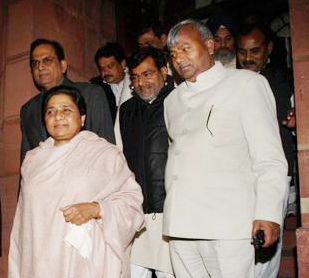 New Delhi, December 19: In a shocking incident, a Samajwadi Party member stunned the Lok Sabha this afternoon snatching the copy of the quota in promotion Bill from Minister V Narayanasamy and was sought to be thwarted by Congress President Sonia Gandhi.
New Delhi, December 19: In a shocking incident, a Samajwadi Party member stunned the Lok Sabha this afternoon snatching the copy of the quota in promotion Bill from Minister V Narayanasamy and was sought to be thwarted by Congress President Sonia Gandhi.
The sudden action of member from Nagina Yashveer Singh came when Minister of State for Personnel Narayanasamy was moving the bill for consideration from the second row and Ms Gandhi, who is also the UPA Chairperson, was occupying her usual front seat.
Mr Singh had, meanwhile, passed on the Bill to his party colleague Neeraj Shekhar which fell down.
Shocked by Mr Singh’s action, which caused commotion in the House, some Congress members led by Ms Gandhi immediately came to the Well to stop Mr Singh, which created a near scuffle like situation. The Congress members included K Bapiraju and Vilas Muttemwar.
This was because the SP members were already in the Well in strength vociferously protesting against taking up the measure.
The situation led to a verbal spat between the Congress and SP members.
Speaker Meira Kumar was so shocked by the incident that she abruptly adjourned the House for the day.
Amid the melee, several Congress members rushed to the Well and surrounded Ms Gandhi in an apparent bid to protect the leader who was being questioned by SP members for thwarting Mr Singh.
Although the Speaker left the House, the commotion persisted.
In order to calm the tempers in the surcharged House, Parliamentary Affairs Minister Kamal Nath walked up to SP supremo Mulayam Singh Yadav who was surrounded by his party colleagues including Mr Singh.
Congress members also sought to reach out to the BJP in the wake of incident but not to much success.
Samajwadi Party has been isolated on its opposition to the Bill which will ensure quota in promotion in government jobs for SC/ST employees.
BSP supremo Mayawati, an arch detractor of Samajwadi Party in Uttar Pradesh politics, has been seeking to take credit for the passage of the Bill in the Rajya Sabha.
Terming the incident as “very deplorable and extremely unfortunate”, Mr Kamal Nath later told reporters, “We will urge the Speaker to condemn it and take action against the member.” “The Bill will be taken up tomorrow when the House meets,” he said, maintaining that such an act “frustrates parliamentary democracy.”
Mr Nath said since Ms Gandhi was closest to the spot where the snatching incident occurred, she asked the member to return the papers he had snatched.
“In democracy, if you are against something, you vote against it. But you can’t do this. I condemn it. If they show such an attitude, there is no need for democracy or Parliament or the media,” the Minister said.





Comments
Add new comment